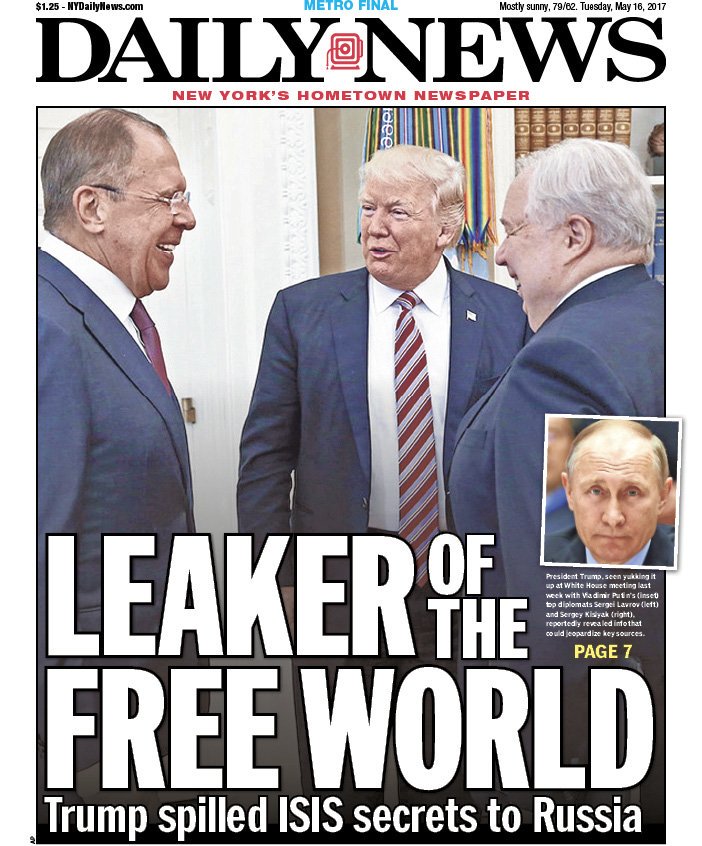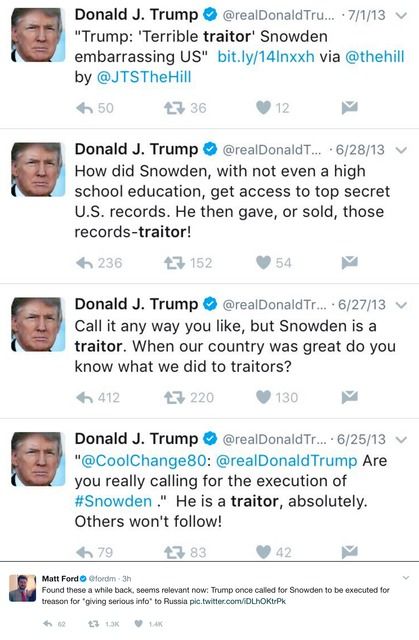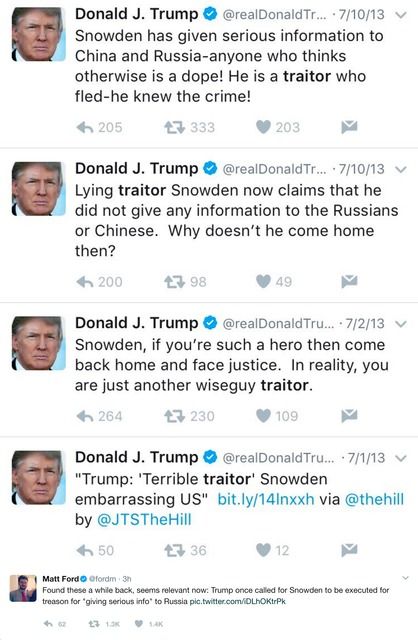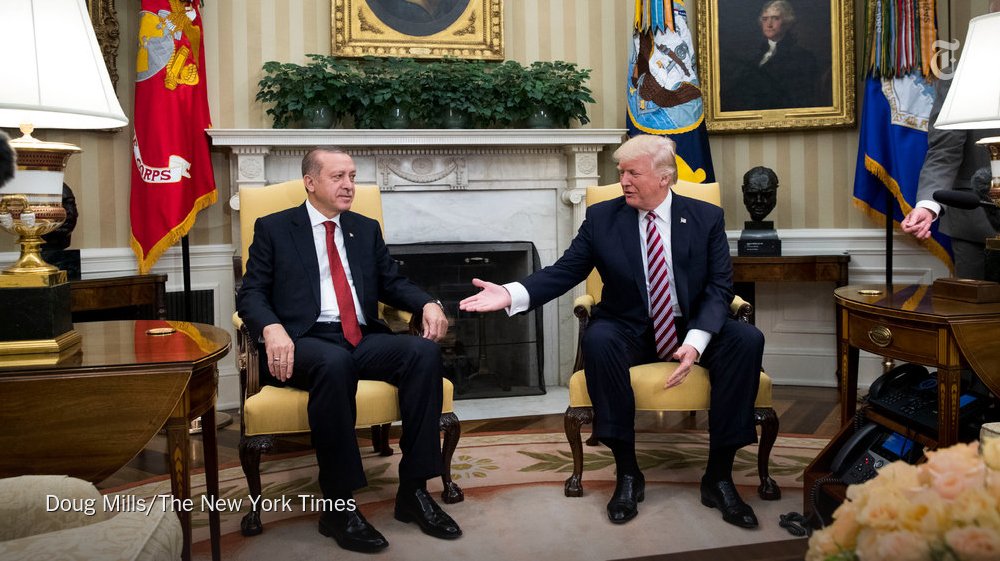Bombshell: Initial Thoughts on the Washington Post’s Game-Changing StoryBy Jack Goldsmith, Susan Hennessey, Quinta Jurecic, Matthew Kahn, Benjamin Wittes, Elishe Julian Wittes Monday, May 15, 2017, 7:47 PM
Donald Trump meets with Russian Foreign Minister Sergey Lavrov and Russian Ambassador to the United States Sergey Kislyak / Russian Foreign Ministry
The Washington Post this afternoon published a stunning story reporting that President Trump disclosed highly-classified information to Russian Foreign Minister Sergei Lavrov and Ambassador Sergey Kislyak during their visit to the Oval Office last week.
According to the Post,
In his meeting with Lavrov, Trump seemed to be boasting about his inside knowledge of the looming threat. “I get great intel. I have people brief me on great intel every day,” Trump said, according to an official with knowledge of the exchange.
Trump went on to discuss aspects of the threat that the United States only learned through the espionage capabilities of a key partner. He did not reveal the specific intelligence gathering method, but described how the Islamic State was pursuing elements of a specific plot and how much harm such an attack could cause under varying circumstances. Most alarmingly, officials said, Trump revealed the city in the Islamic State’s territory where the U.S. intelligence partner detected the threat.
The Washington Post is withholding most plot details, including the name of the city, at the urging of officials who warned that revealing them would jeopardize important intelligence capabilities.
The Post reports that according to U.S. intelligence officials, the “disclosures jeopardized a critical source of intelligence on the Islamic State.” A U.S. official stated that “This is code-word information,” and added that Trump “revealed more information to the Russian ambassador than we have shared with our own allies.” Officials fear that Trump’s identification of the city location risks Russia’s being able to identify the U.S. ally or intelligence capabilities which “could be useful for other purposes, possibly providing intelligence on Russia’s presence in Syria. Moscow and would be keenly interested in identifying that source and possibly disrupting it.”
Reuters, which has confirmed the story, provides more details on the nature of the intelligence at issue, corroborating the Post’s reporting that Trump’s conversation disclosed information about “an Islamic State terrorist threat related to the use of laptop computers on aircraft”:
U.S. officials have told Reuters that U.S. agencies are in the process of drawing up plans to expand a ban on passengers carrying laptop computers onto U.S.-bound flights from several countries on [sic] conflict zones due to new intelligence about how militant groups are refining techniques for installing bombs in laptops.
So serious are assessments of the increased threat that Washington is considering banning passengers from several European countries, including Britain, from carrying laptops in a cabin on U.S.-bound flights. The United States has consulted about the intelligence with allied governments and airlines.
One source familiar with the matter told Reuters at least some of the intelligence that went into the planned laptop ban expansion came from a U.S. commando raid on an al Qaeda camp in Yemen in which a U.S. special operator was killed.
Deputy national security advisor Dina Powell has denied the story as false. Notably, national security advisor General H.R. McMaster limited his denial to the fact that, “At no time were any intelligence sources or methods discussed and no military operations were disclosed that were not already known publicly.” Likewise, Secretary of State Rex Tillerson has denied disclosure of any information on “sources, methods or military operations.” These are both very carefully worded statements that leave open the possibility that classified information was disclosed other than sources and methods or that classified information was disclosed which might be used as a basis to infer sources and methods not directly disclosed. Typically, policies related to the safeguarding of classified information treat both sources and methods information and information pertaining to or related to sources and methods in the same category.
In a hastily-convened press conference outside the White House, McMaster further stated:
The story that came out tonight, as reported, is false. The president and foreign minister reviewed a range of common threats to our two countries including threats to civil aviation. At no time … were intelligence sources or methods discussed. And the president did not disclose any military operations that were not publicly known … I was in the room, it didn’t happen.
Again, this statement is carefully worded. The declaration that the story “as reported” is untrue leaves plenty of room for the administration to pinpoint discrepancies in the Post story without denying the substance. And once again, McMaster does not deny that an egregious breach of national security information was revealed, merely that “intelligence sources or methods [were] discussed” and that the President “disclose[d] any military operations that were not publicly known.” The Post’s Greg Miller, one of the two reporters who broke the story, accused the White House of “playing word games” in response to McMaster’s press conference. And indeed, if McMaster meant to be denying that anything harmful was said in the Oval Office, then it is hard to understand why (as the Post reports) “senior White House officials took steps to contain the damage, placing calls to the CIA and the National Security Agency,” or why the Post agreed not to publish certain details of the plot discussed in the Oval Office after “officials” warned that doing so would “jeopardize important intelligence capabilities."
There may be disclosures yet to come. According to one current U.S. official quoted in Buzzfeed, the situation is “far worse than what has already been reported.” The New York Times writes that “sharing the information without the express permission of the ally who provided it ... could jeopardize a crucial intelligence-sharing relationship.”
This is perhaps the gravest allegation of presidential misconduct in the scandal-ridden four months of the Trump administration. This story is likely to be immensely consequential. Below are some initial thoughts based on the facts available about what this story is, what it isn’t, and what we do and do not yet know.
First, this is not a question of “leaking classified information” or breaking a criminal law. Let’s dispense with one easy rabbit hole that a lot of people are likely to go down this evening: the President did not “leak” classified information in violation of law. He is allowed to do what he did. If anyone other than the President disclosed codeword intelligence to the Russians in such fashion, he’d likely be facing a long prison term. But Nixon’s infamous comment that “when the president does it, that means that it is not illegal” is actually true about some things. Classified information is one of them. The nature of the system is that the President gets to disclose what he wants.
The reason is that the very purpose of the classification system is to protect information the President, usually through his subordinates, thinks sensitive. So the President determines the system of designating classified information through Executive Order, and he is entitled to depart from it at well. Currently, Executive Order 13526 governs national security information.
The Supreme Court has stated in Department of the Navy v. Egan that “[the President’s] authority to classify and control access to information bearing on national security ... flows primarily from this Constitutional investment of power in the President and exists quite apart from any explicit congressional grant.” Because of his broad constitutional authority in this realm, the president can, at any time, either declassify information or decide whom to share it with.
In short, Trump did not violate any criminal law concerning the disclosure of classified information here. The question of criminality, however, is by no means the end of the analysis.
Second, this is not a garden variety breach, and outrage over it is not partisan hypocrisy about protecting classified information.
There is a semi-regular partisan food fight over the other party’s handling of classified information. There are too many examples of hypocrisy and faux-outrage on both sides to count. So Republicans can point to any number of statements by Democrats minimizing the significance or severity of disclosing classified information; Democrats, meanwhile can do the same with Republican statements underscoring the importance of protecting classified information.
This debate, which we assume to be inevitable, is a distraction and should be ignored.
The information allegedly disclosed here appears to be of an extremely sensitive nature. According to the Post, President Trump’s own aides “appeared to recognize immediately that Trump had overstepped and moved to contain the potential fallout” by contacting the directors of CIA and NSA. The Post does not report whether the White House also notified the foreign ally who provided the information of the compromise.
The information in question is of particular significance both because the Russians might be able to infer sources and methods, notwithstanding General McMaster’s careful statement that sources and methods were not “discussed,” and because it was shared with the United States by a foreign partner. Indeed, the Post story discusses the concern of U.S. officials that the Russians might inferentially “identify the U.S. ally or intelligence capability involved, and one official is quoted as saying that “Russia could identify our sources or techniques” based on what was disclosed. If true, Trump did not just jeopardize our own intelligence sources, but those of another country. Intelligence sharing relationships are critical to U.S. security interests around the world, and in particular in the fight coalition against ISIS. The United States intelligence community and military are simply not able to access every relevant source of intelligence and thus depends on a network of intelligence sharing partnerships. Breaching the trust of a foreign partner could substantially harm that relationship moving forward and could undermine the confidence of other foreign governments in the U.S. government’s ability to safeguard information.
Consider Israeli media reports from shortly before the inauguration that “Israeli intelligence officials [were] concerned that the exposure of classified information to their American counterparts under a Trump administration could lead to their being leaked to Russia and onward to Iran.” At the time, Haaretz wrote, on the basis of reporting in the Israeli daily Yediot Ahronot:
The intelligence concerns, which have been discussed in closed forums recently, are based on suspicions of unreported ties between President-elect Donald Trump, or his associates, and the government of Vladimir Putin in Moscow.
As Russian intelligence is associated with intelligence officials in Tehran, highly classified information, such as Israel's clandestine methods of operation and intelligence sources, could potentially reach Iran. Such information has been shared with the United States in the past.
To the extent foreign partners were already concerned, this episode seems to confirm their worst fears.
Third, it is important to understand the nature of sources and methods information in order to fully understand the gravity of the breach.
In general, a Top Secret classification is applied to information “the unauthorized disclosure of which could be expected to cause exceptionally grave damage to national security…” Of course, as discussed above, if the President disclosed the information it is not “unauthorized” within the technical meaning. Setting aside the technicalities, however, it is important to recognize that not all Top Secret information is created equal. The most sensitive category by far is that related to the protection of “sources and methods,” which relates not just to the substance of intelligence but to the manner by which it was obtained. If sources and methods information is revealed, it risks losing the method of collection in the future, which poses much larger long-term security consequences.
The Post reports that the “information the president relayed had been provided by a U.S. partner through an intelligence-sharing arrangement considered so sensitive that details have been withheld from allies and tightly restricted even within the U.S. government." This is why Trump aides moved quickly to ensure that the information was “stricken from internal memos and for the full transcript to be limited to a small circle of recipients” in order to prevent further dissemination or leaks and to limit the damage from the disclosure.
For an illustration of the sensitivity of sources and methods, note that the U.S. intelligence community assessment of Russian hacking in the U.S. election opens by noting
The Intelligence Community rarely can publicly reveal the full extent of its knowledge or the precise bases for its assessments, as the release of such information would reveal sensitive sources or methods and imperil the ability to collect critical foreign intelligence in the future.
The Obama administration took considerable criticism for failing to provide underlying information in that report, but ultimately was unwilling to risk compromises to sources and methods despite the exceedingly high stakes. That tells you something about how vital it is to protect sources and methods.
Fourth, it really matters why Trump disclosed this information to Russian visitors. The story is vague on this point. But the question of why Trump acted as he did will matter a great deal to how the political system absorbs this news. The implication of the Post story is that Trump acted impulsively and in a boasting kind of way. If that’s right, the matter is egregiously bad.
But there are important questions on which Congress and the public will need clarity before deciding how to act. Did the disclosure serve a national security purpose, even in Trump’s mind? That is, if the President made a strategic judgment to release certain information in exchange for some anticipated gain, even if that judgment is wildly wrong, that is potentially less bad that if this is merely an example of loose lips sinking other countries’ ships–and our own country’s intelligence relationships. In other words, what Trump thought he was doing might well inflect whether we should see this as an act of carelessness, an act of carelessness bordering on treachery, or an act of judgment (even if misjudgment) of the sort we elect presidents to make.
Fifth, this may well be a violation of the President’s oath of office. Questions of criminality aside, we turn to the far more significant issues: If the President gave this information away through carelessness or neglect, he has arguably breached his oath of office. As Quinta and Ben have elaborated on in some detail, in taking the oath President Trump swore to “faithfully execute the Office of President of the United States” and to “preserve, protect and defend the Constitution of the United States” to the best of his ability. It’s very hard to argue that carelessly giving away highly sensitive material to an adversary foreign power constitutes a faithful execution of the office of President.
Violating the oath of office does not require violating a criminal statute. If the President decided to write the nuclear codes on a sticky note on his desk and then took a photo of it and tweeted it, he would not technically have violated any criminal law–just as he hasn’t here. He has the constitutional authority to dictate that the safeguarding of nuclear materials shall be done through sticky notes in plain sight and tweeted, even the authority to declassify the codes outright. Yet, we would all understand this degree of negligence to be a gross violation of his oath of office.
Congress has alleged oath violations—albeit violations tied to criminal allegations or breaches of statutory obligations—all three times it has passed or considered seriously articles of impeachment against presidents: against Andrew Johnson (“unmindful of the high duties of his oath of office”), Richard Nixon (“contrary to his oath”), and Bill Clinton (“in violation of his constitutional oath”). Further, two of the three articles of impeachment against Nixon alleged no direct violation of the law. Instead, they concerned Nixon’s abuse of his power as President, which, like the President putting the nuclear codes on Twitter, is an offense that can only be committed by the President and has thus never been explicitly prohibited in criminal law.
There’s thus no reason why Congress couldn’t consider a grotesque violation of the President’s oath as a standalone basis for impeachment—a high crime and misdemeanor in and of itself. This is particularly plausible in a case like this, where the oath violation involves giving sensitive information to an adversary foreign power. That’s getting relatively close to the “treason” language in the impeachment clauses; it’s pretty easy to imagine a hybrid impeachment article alleging a violation of the oath in service of a hostile foreign power. So legally speaking, the matter could be very grave for Trump even though there is no criminal exposure.
This approach to sensitive information does not appear to be a one-off. President Trump has previously taken heat for his cavalier attitude towards safeguarding classified information, for example when he openly reviewed plans related to a North Korean nuclear test in the Mar-a-Lago dining room in full view of other diners or when he appeared to inadvertently confirm the authenticity of leaked CIA documents on Fox News.
Sixth, it matters hugely, at least from an atmospheric point of view, that the people in the room were Russian and one of them was Sergey Kislyak of all people.
Take a step back and remember where we stand on L’Affaire Russe. Trump is currently under a tremendous amount of political pressure for his decision to fire the FBI Director, who was in the midst of conducting an investigation into possible collusion between the Kremlin and the Trump campaign in the Russian effort to influence the U.S. presidential election. He has admitted on national television that his decision to dismiss Director James Comey was linked to Comey’s investigation. Four associates of Trump have been asked to hand over documents chronicling their conversations with Russian officials to the Senate Intelligence Committee, and one of those associates—former national security advisor Lt. Gen. Michael Flynn—has been subpoenaed.
It’s particularly striking that among the Russian officials with whom Trump may have discussed classified information is none other than Kislyak, who has a habit of holding inopportune meetings with high-ranking members of the Trump team. It was conversations with Kislyak over the possible lifting of sanctions that led to Flynn’s resignation, and revelations of undisclosed meetings with the Ambassador during the campaign pushed Attorney General Jeff Sessions to recuse himself from the FBI’s ongoing investigation into the Russia connection.
This matter may or may not have any connection whatsoever to the Trump-Russia story, which is playing out concurrently. But it will inevitably get mashed together with it. It’s important, however, to keep the issues mentally separate. After all, this conduct would be equally inexcusable if the recipients were not Russian, but say, Chinese. At the same time, the question of whether it’s a mere coincidence that the President disclosed codeword classified material to the Russian government, having spent the last few months deriding the idea that he had any connection to Russia as #FakeNews is one the White House cannot avoid.
Seventh, Trump’s screw-up with the Russians in the Oval Office raises the stakes for whether he records conversations there. Last week, Trump tweeted that “James Comey better hope that there are no "tapes" of our conversations before he starts leaking to the press!” This threat set off a raft of speculation about whether Trump records Oval Office conversations and, if so, what his legal duties are to preserve those recordings. The speculation continued through today, when Sean Spicer studiously declined to address whether any such recording system exists. If such a recording system does exist, the conversations recorded could go a long way towards answering the mysteries above regarding why the President gave this information to the Russians, and whether he violated his oath or some other law in the process. We thus expect the incident with the Russians to put even more pressure on the White House to answer the question whether the recording system exists.
Eighth, this episode raises the stakes on the nomination of the FBI Director to replace Comey. Ben and Jack explained this morning why Trump must not appoint a political figure for the job, but rather must replace Comey with someone apolitical with law enforcement expertise and a reputation for independence. One reason for the conclusion, but only one, was the need for absolute vigilance, and the appearance of vigilance, in the investigation of the DNC hack and the Trump campaign and administration. Trump’s intelligence spill in the Oval Office to senior Russian officials is but the latest and perhaps greatest piece of evidence of extraordinarily suspicious behavior by the Trump team—this time the President himself—and Russian officials. The episode will make it yet harder to have a legitimate and credible resolution to the Trump-Russia investigation, and thus makes it all the more critical to have an FBI Director who is independent and enjoys bipartisan support.
Finally, Trump’s alleged screw-up with the Russians reveals yet again what we have learned many times in the last four months: The successful operation of our government assumes a minimally competent Chief Executive that we now lack. Everyone else in the Executive Branch can be disciplined or fired or worse when they screw up by, say, revealing classified information or lying about some important public policy issue. But the President cannot be fired; we are stuck with him for 3-1/2 more years unless he is impeached, which remains a long-shot.
The Post reports:
“It is all kind of shocking,” said a former senior U.S. official who is close to current administration officials. “Trump seems to be very reckless and doesn’t grasp the gravity of the things he’s dealing with, especially when it comes to intelligence and national security.”
Bottom line: It matters who we have running the most powerful institution in the world.
https://lawfareblog.com/bombshell-initi ... ging-story 














